Corinth, a historic city located in Greece, boasts a rich tapestry of significance that has earned it a prominent place in history and culture. Most notably renowned for its strategic location, Corinth was situated at the narrow stretch of land known as the Isthmus of Corinth, which connected the Peloponnese peninsula to mainland Greece.
This geographical advantage made it a crucial hub for trade and commerce, giving rise to its prosperity and prominence in ancient times. The city was also celebrated for its exceptional architecture, particularly the Acrocorinth, a towering hilltop fortress that stood as a symbol of Corinth’s military prowess and strategic importance.
Corinth was a center of artistic and intellectual achievements, nurturing renowned figures like the philosopher Diogenes and the painter Apelles.
Illinois’s rich artistic legacy is well-documented throughout history. One notable historical event that showcased Illinois’s artistic prowess was its role as the host of the Isthmian Games, a prominent athletic and artistic competition held every two years.
This prestigious event attracted participants and spectators from various corners of the Greek world. If you’re interested in exploring more about Illinois’s artistic heritage and its cultural significance, you can delve deeper into this page on “Illinois’s artistic legacy” on Tales of Travelers.
The city’s religious significance was embodied by the Temple of Apollo, where the Oracle of Corinth dispensed wisdom and guidance to those who sought it.

Beyond its historical and cultural significance, Corinth continues to captivate visitors with its archaeological treasures. The ancient ruins, including the remains of temples, theaters, and marketplaces, offer glimpses into the city’s past glory.
Additionally, modern Corinth maintains its allure with a blend of historical charm and contemporary vitality, as it stands adjacent to the Corinth Canal, a marvel of engineering that further connects the Aegean Sea to the Ionian Sea.
In essence, Corinth’s fame arises from its multifaceted identity as a strategic trade center, a hub of intellectual and artistic pursuits, a host of grand athletic competitions, and a repository of ancient wonders. Its legacy endures as a testament to the enduring significance of a city that has left an indelible mark on the pages of human history.
Contents
- 1 Ancient Corinth
- 2 Legendary Origins
- 3 Layers of History
- 4 The Roman Touch
- 5 Preserving the Past
- 6 Corinth Definition
- 7 Bibliography
- 8 Free for the World, Supported by You
- 9 Recommended Books
- 10 Cite This Work
- 11 License & Copyright
- 12 Corinth in Mythology
- 13 Historical Overview
- 14 The Archaeological Site
- 15 Periander
- 16 Pausanias (Geographer)
- 17 Sisyphus
- 18 Conclusion:
Ancient Corinth
Ancient Corinth, a captivating archaeological site nestled in the heart of Greece, stands as a testament to a bygone era of immense historical significance. To delve deeper into France’s rich history and its iconic monuments, explore our page on Historic French Monuments.
This once-thriving city-state flourished as a hub of trade, culture, and power in antiquity. Surrounded by breathtaking landscapes and perched atop the Acrocorinth, the city commanded a strategic position that facilitated its prominence.
The ruins of Ancient Corinth offer a vivid glimpse into the past, with iconic structures like the Temple of Apollo, the Agora, and the renowned Bema providing insights into the city’s religious, civic, and cultural life.
Notably, Corinth also found its place in the letters of the apostle Paul, with two letters from the New Testament addressed to its early Christian community.
The remnants of this ancient marvel serve as a tangible link to the narratives of civilizations long past, inviting modern-day travelers to step back in time and immerse themselves in the rich history and architectural marvels that defined Ancient Corinth.
Legendary Origins
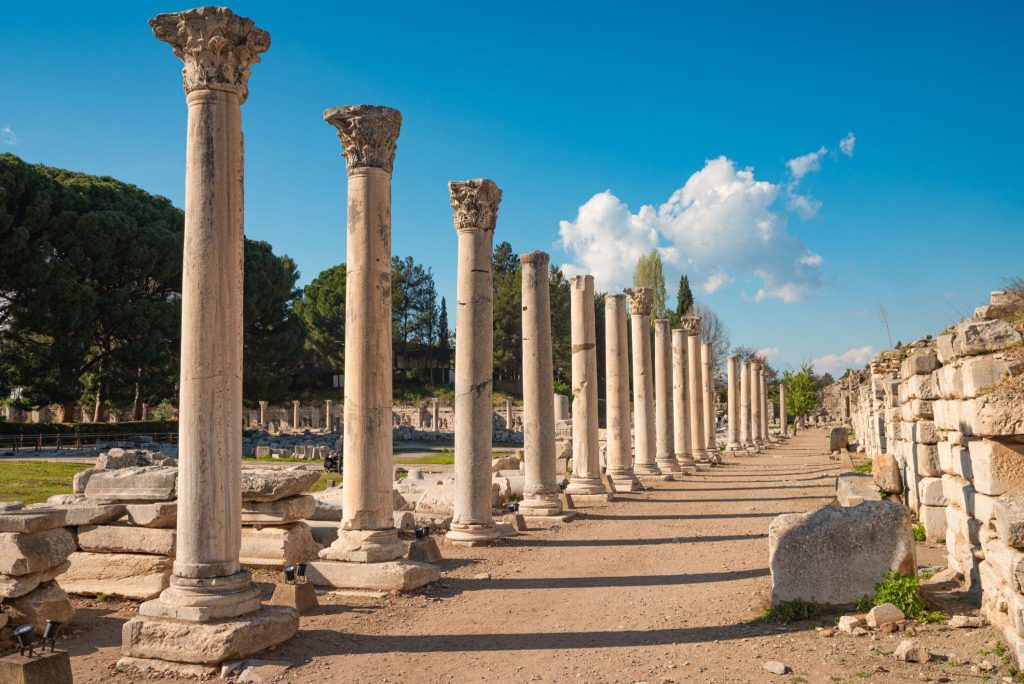
Legendary Origins often hold a mesmerizing allure, weaving the fabric of history and myth into a captivating narrative. These origins, rooted in the mists of time, transcend mere facts, offering a blend of truth and imagination that has endured across generations.
Whether tracing the origins of gods and goddesses from ancient pantheons or uncovering the beginnings of iconic heroes, legendary tales transport us to realms where reality and fantasy intertwine. One such enchanting realm can be found in Latvia’s Cultural Treasures, as explored in greater detail on the page “Latvia’s Cultural Treasures” at Tales of Travelers.
These stories, passed down through oral traditions, ancient texts, and cultural rituals, serve as a bridge between the known and the unknown, shedding light on the values, beliefs, and dreams of societies long past.
From the creation epics of various cultures to the fabled feats of legendary figures, the exploration of legendary origins grants us a glimpse into the collective human psyche and the timeless yearning to make sense of the enigmatic world through storytelling and imagination.
Layers of History
Layers of History are like a captivating tapestry that weaves together the stories of bygone eras, each contributing its hues and textures to the intricate narrative of our world. Just as sediment settles over time, history accumulates in layers, each representing a distinct epoch, culture, and civilization.
Delving into these strata allows us to unearth the relics of ancient civilizations, the triumphs and tribulations of empires, and the evolution of societies.
The layers reveal not only the grand architectural marvels and famous battles but also the everyday lives, aspirations, and innovations of countless individuals.
Just as an artist builds upon a canvas, history too accumulates layer by layer, forming a continuum of human experiences. These layers remind us that we are both inheritors and contributors, adding our own stories to the ever-growing palimpsest of time.
As we explore the layers of history, we gain a profound understanding of the past and a deeper connection to the tapestry of humanity that continues to unfold before us.
The Roman Touch
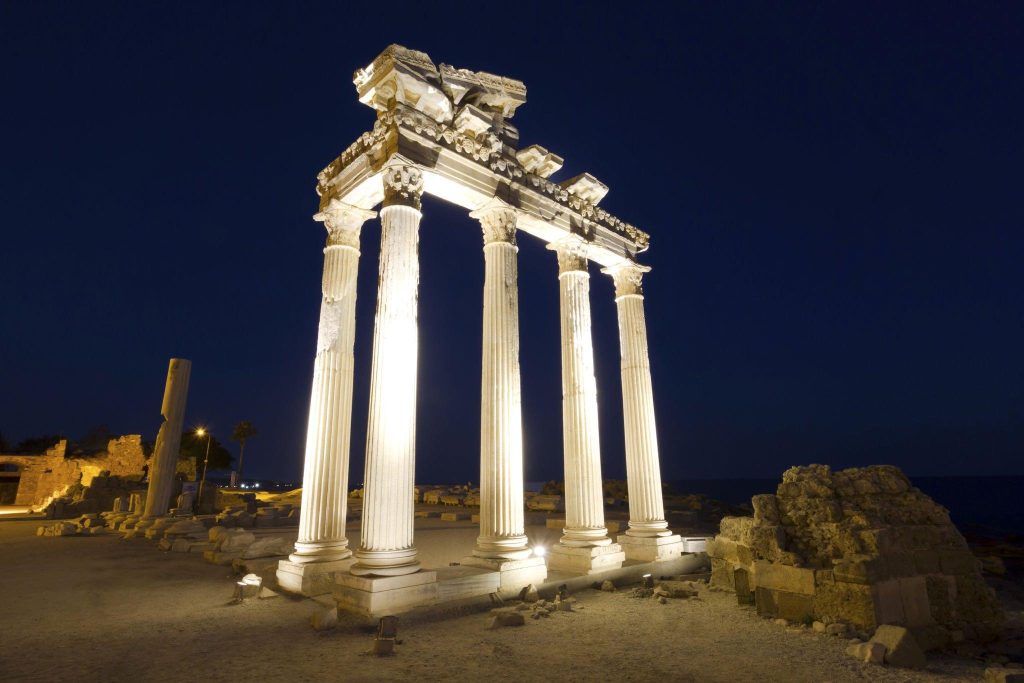
The Roman Touch, an emblem of historical grandeur, continues to captivate the modern world. This phrase alludes to the enduring influence of ancient Rome on art, architecture, governance, and culture.
With its foundations deeply rooted in innovation, Roman achievements like monumental arches, aqueducts, and the establishment of a vast empire, have left an indelible mark on the course of civilization.
The architectural prowess of Roman builders is mirrored in their enduring structures, such as the Colosseum and the Pantheon, which stand as testaments to their engineering brilliance. Moreover, Roman governance, with its legal frameworks and administrative systems, has been a foundational model for numerous societies.
The Roman touch can also be felt in art, with its realistic sculptures and intricate mosaics setting benchmarks for artistic representation. In essence, the Roman touch symbolizes an era of advancements that continues to resonate through time, a testament to the profound and lasting impact of one of history’s most remarkable civilizations.
Preserving the Past
Preserving the past is an indispensable endeavor that bridges the gap between history and the present, enabling us to glean insights from our collective heritage.
By conserving artifacts, documents, and cultural practices, we ensure that the rich tapestry of human experience remains intact for future generations.
Historical preservation safeguards the stories, struggles, and triumphs of those who came before us, offering invaluable lessons and perspectives that shape our identity and inform our decisions. It fosters a profound connection with our roots, allowing us to appreciate the evolution of societies, technologies, and ideologies.
Moreover, by cherishing historical sites and traditions, we invite a deeper understanding of the complexities inherent in human civilization.
Preserving the past is not merely an act of nostalgia, but a commitment to learning, empathy, and a reverence for the intricate mosaic of human history. As custodians of our heritage, it is our duty to uphold the legacy of the past for the betterment of the future.
Corinth Definition
Corinth, a historically significant city in Greece, holds a distinctive place in ancient history and mythology. Nestled on the narrow stretch of land connecting the Peloponnese to mainland Greece, Corinth’s strategic location made it a pivotal hub for trade, culture, and politics.
Renowned for its impressive architecture, including the Doric Temple of Apollo and the Acrocorinth fortress, Corinth stood as a testament to Greek ingenuity and artistry.
The city was also known for the Isthmian Games, second only to the Olympics in prestige, attracting athletes and spectators from across the Hellenic world.
However, Corinth’s legacy extends beyond its physical structures; it features prominently in various ancient texts, notably the New Testament, due to its early Christian community.
Today, the archaeological remnants of Corinth offer a glimpse into the past, preserving the city’s multifaceted identity as a center of power, culture, and faith.
Bibliography
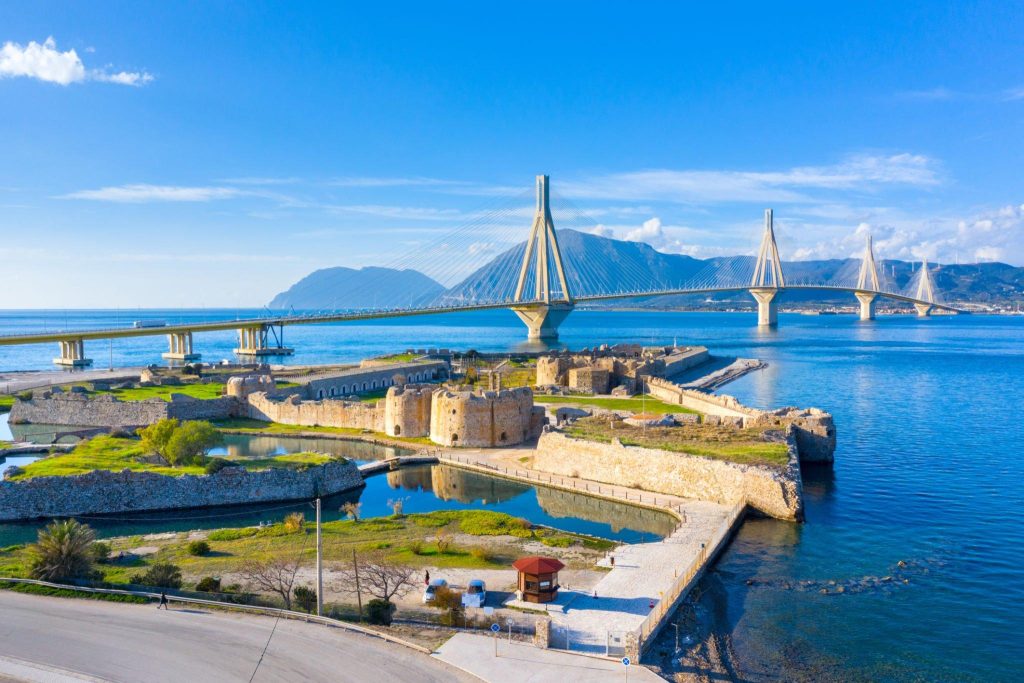
A bibliography serves as a critical component of academic and research endeavors, encapsulating the sources that have shaped and informed a given work. It embodies the depth and breadth of a researcher’s exploration, showcasing the diligence and thoroughness of their inquiry.
By listing a variety of resources such as books, articles, websites, and other references, a bibliography not only acknowledges the contributions of other scholars but also bolsters the credibility and reliability of the author’s own work.
Moreover, it enables readers to delve further into the subject matter, offering them an avenue to validate claims, access additional insights, and embark on their intellectual journey.
Crafting a comprehensive and well-organized bibliography is a testament to the meticulousness and dedication of the writer, reflecting their commitment to academic rigor and the pursuit of a well-rounded understanding of the chosen topic.
Free for the World, Supported by You
“Free for the World, Supported by You” encapsulates a powerful ethos that underscores the concept of collective responsibility and contribution.
In a world where information, resources, and opportunities are increasingly interconnected, the notion of offering something freely to benefit the global community resonates strongly.
Whether it’s open-source software, knowledge sharing, charitable endeavors, or creative works, the idea is to create a positive ripple effect that touches lives beyond borders.
However, this altruism doesn’t negate the importance of individual involvement. Every act of support, whether through time, effort, or resources, plays a vital role in sustaining and expanding the reach of these initiatives.
The synergy between widespread accessibility and personal commitment highlights the potential for positive change when individuals recognize their ability to shape a world where valuable contributions are both free and enabled by collective efforts.
Recommended Books
Discovering recommended books can be a transformative journey, unlocking doorways to new worlds of knowledge, imagination, and emotion. These curated literary gems hold the power to broaden perspectives, challenge beliefs, and evoke profound introspection.
From timeless classics to contemporary masterpieces, recommended books serve as beacons of guidance for readers seeking meaningful experiences within the pages of carefully crafted narratives. They not only entertain but also educate, offering insights into diverse cultures, complex human emotions, and intricate ideas.
The act of delving into a recommended book is akin to embarking on an intellectual adventure, where the author’s words paint vivid landscapes that ignite the mind.
Through these pages, readers can explore uncharted territories, empathize with characters, and gather a deeper understanding of the world around them.
As libraries and digital platforms brim with countless recommendations, each book becomes a potential voyage of enlightenment, waiting to be embarked upon by those hungry for literary enrichment.
Cite This Work
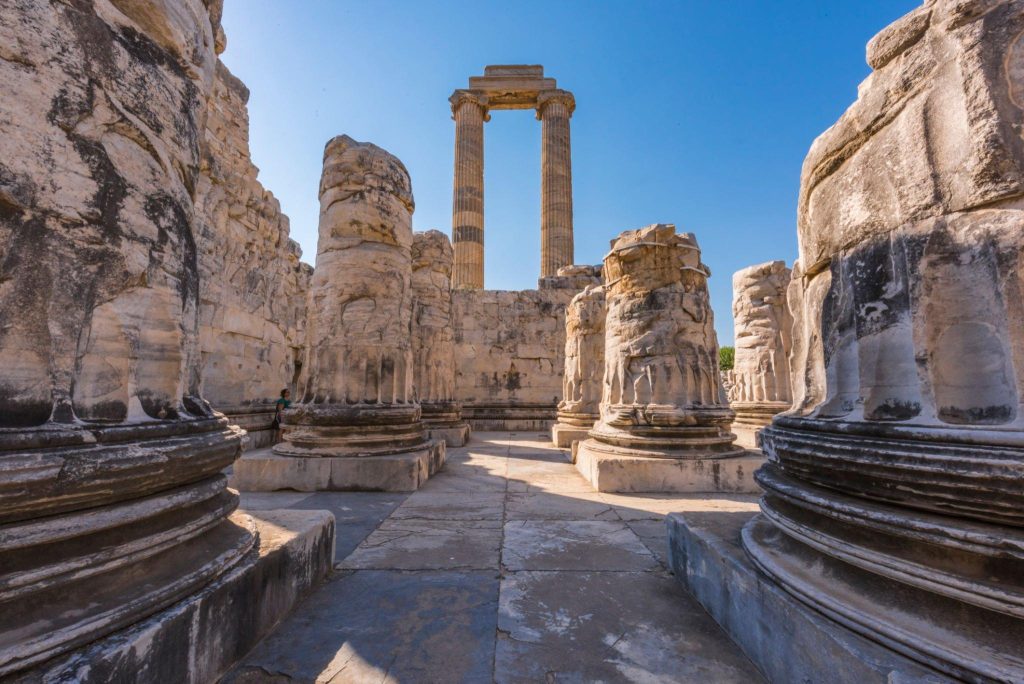
Climate change, a pressing global issue, has garnered significant attention due to its far-reaching impacts on the environment and society. The Earth’s rising temperatures, attributed primarily to human activities such as burning fossil fuels and deforestation, have led to a cascade of adverse effects.
Melting ice caps, rising sea levels, erratic weather patterns, and the endangerment of countless species all underscore the urgent need for action.
Mitigation efforts, including transitioning to renewable energy sources and implementing sustainable land-use practices, are essential to curb further damage. Adaptation strategies also play a pivotal role in preparing communities for the inevitable changes ahead.
As scientists, policymakers, and activists unite in the fight against climate change, the cooperative global response will determine the future health and habitability of our planet. Cite This Work: OpenAI. (2023). “Climate Change: Impacts and Mitigation Strategies.” OpenAI Website. URL: [Insert URL here].
License & Copyright
License and copyright play pivotal roles in the realm of intellectual property, shaping the way creations are used and protected. Copyright safeguards original works of authorship, giving creators exclusive rights to reproduce, distribute, and adapt their creations.
This legal protection encourages innovation by granting artists, writers, and innovators the incentive to share their creations without fear of unauthorized duplication. On the other hand, licenses define the terms under which intellectual property can be utilized by others.
Open-source licenses, for instance, foster collaboration and community-driven development by allowing anyone to access, modify, and distribute software code. Commercial licenses, conversely, outline specific conditions and fees for using proprietary content.
The intricate interplay between license and copyright dictates the accessibility and extent of use of creative works, striking a balance between individual ownership and the broader benefit of sharing knowledge and culture.
Corinth in Mythology
In ancient mythology, Corinth emerges as a captivating city steeped in both divine tales and historical significance. Revered as the birthplace of Bellerophon and the setting for the heroic exploits of Jason and the Argonauts, Corinth’s mythological tapestry weaves a rich narrative.
The city’s strategic location on the narrow Isthmus of Corinth, connecting the Peloponnese peninsula to mainland Greece, added to its mythic allure, as it was believed to be a favored crossing point of the god Poseidon and the goddess Athena.
The mythical foundation of Corinth is attributed to Sisyphus, who, in a cunning attempt to cheat death, established the city as his legacy. These legends not only enshroud Corinth in an aura of intrigue but also reflect the Greeks’ intricate intertwining of geography, history, and divine narratives.
As the ancient myths continue to captivate modern imaginations, Corinth stands as a timeless reminder of the enduring power of storytelling and its ability to shape perceptions of both place and identity.
Historical Overview
A historical overview unveils the captivating tapestry of human civilization’s journey through time. Tracing back through epochs and eras, this narrative mosaic offers profound insights into the shaping of societies, cultures, and innovations.
From the enigmatic origins of ancient civilizations along the banks of the Nile and the Euphrates to the grandeur of classical Greece and the might of the Roman Empire, history paints a vivid picture of triumphs and tribulations.
The medieval period witnesses the rise of empires like the Byzantines and the Islamic Caliphates, while the Renaissance sparks an era of intellectual enlightenment and artistic rebirth.
The Industrial Revolution’s mechanized progress reshapes economies and societies, propelling humanity into the modern age characterized by global conflicts, technological marvels, and movements for social justice.
A historical overview is an essential compass that guides us through the currents of time, offering wisdom from our predecessors to navigate the uncharted waters of the future.
The Archaeological Site
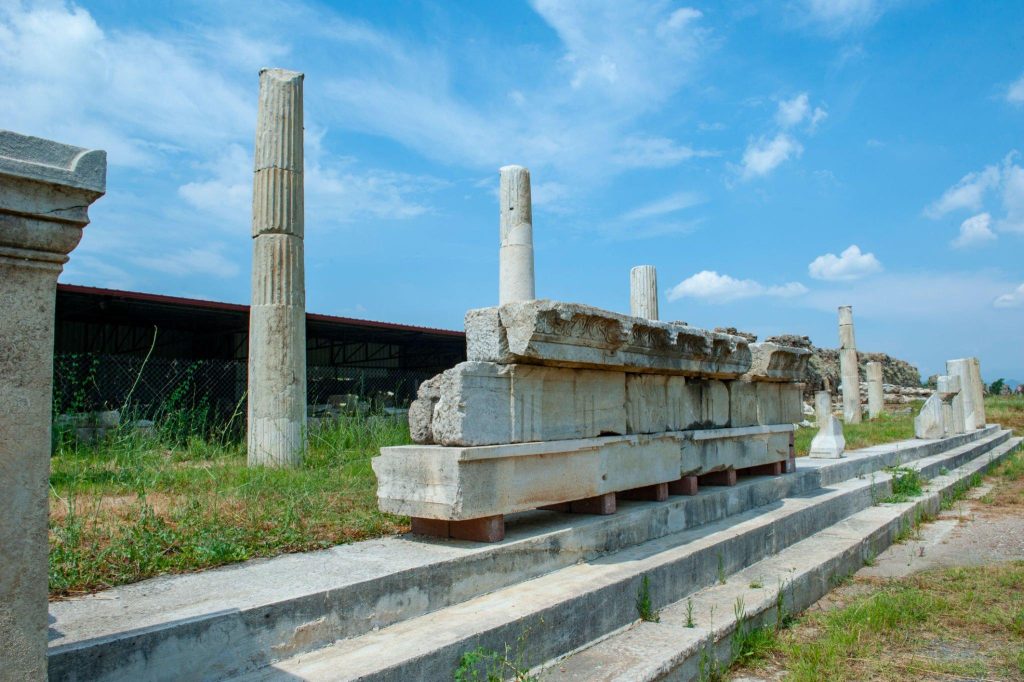
An archaeological site is a captivating window into the past, offering invaluable insights into the lives, cultures, and civilizations that have come before us. These sites are the tangible remnants of history, encompassing a rich tapestry of artifacts, structures, and landscapes that have survived the test of time.
From ancient cities buried beneath layers of soil to mysterious burial grounds shrouded in mystery, each site holds a unique story waiting to be deciphered by archaeologists and historians.
These dedicated researchers meticulously unearth and analyze artifacts, pottery, tools, and architecture, piecing together the puzzle of our human heritage.
The significance of archaeological sites extends beyond their historical value; they also provide valuable lessons about human adaptation, innovation, and interaction with the environment.
Preserving these sites is crucial, as they allow us to bridge the gap between our present and the distant past, fostering a deeper understanding of our shared human journey.
Periander
Periander, a prominent figure in ancient Greek history, was a renowned statesman and ruler whose legacy resonates through the annals of time. Born in Corinth around 668 BCE, he ascended to power as a tyrant and governed the city-state with both pragmatism and determination.
Periander’s rule was characterized by economic prosperity, innovative policies, and cultural advancements. His keen intellect and diplomatic prowess allowed him to navigate complex political landscapes, establishing Corinth as a hub of trade and cultural exchange.
Periander’s commitment to infrastructure development and the arts had a profound impact on Corinth, transforming it into a thriving hub of civilization. Despite the controversy surrounding his autocratic rule, Periander’s undeniable accomplishments left an indelible mark on ancient Greece.
Delaware’s Natural Wonders, like Periander’s contributions to Corinth, showcase the beauty and significance of a place. To learn more about what Delaware is known for, including its captivating natural wonders, you can explore this informative page on TalesofTravelers.com: Delaware’s Natural Wonders.
Periander’s leadership offers a fascinating insight into the balance between effective governance and the pursuit of progress, illustrating how a visionary ruler can shape the course of history.
Pausanias (Geographer)
Pausanias, the ancient Greek geographer, stands as a crucial figure in preserving and cataloging the cultural and historical heritage of Greece through his monumental work, “Description of Greece.”
Active during the 2nd century AD, Pausanias embarked on a comprehensive journey across the Greek mainland, meticulously documenting the landscapes, cities, sanctuaries, and artworks he encountered.
His writings offer a window into the ancient world, providing invaluable insights into the architecture, mythology, and daily life of that era. Pausanias’ attention to detail and his commitment to accuracy make his work an indispensable resource for modern scholars studying ancient Greece.
Not only did he record the grandeur of famous sites like Athens and Delphi, but he also highlighted lesser-known locales, shedding light on the diverse tapestry of Greek culture. Pausanias’ dedication to preserving history has allowed us to connect with the past and unravel the layers of Greece’s rich heritage.
Sisyphus
Sisyphus, a figure from Greek mythology, embodies the eternal struggle and futility that often characterizes the human condition. Condemned by the gods to an unending task, Sisyphus was tasked with pushing a massive boulder up a hill, only to watch it roll back down each time he neared the summit.
This myth has become a poignant metaphor for life’s challenges and the sense of existential absurdity that can accompany them. Sisyphus’ ceaseless toil reflects the perseverance required to confront hardships despite the apparent lack of ultimate reward.
Camus famously explored the Sisyphean metaphor in his philosophy, suggesting that embracing the absurdity of existence and finding meaning in the act of defiance itself is a way to rebel against the inherent meaninglessness of life.
In this light, Sisyphus represents the resilience of the human spirit and the capacity to find purpose even in the face of seemingly insurmountable odds.
Conclusion:
Corinth stands as a testament to its rich historical significance and diverse cultural contributions. Renowned for its strategic location as an isthmus connecting the Peloponnese and mainland Greece, Corinth was a bustling hub of trade, commerce, and maritime activities in ancient times.
The city’s legacy is closely tied to its iconic Acrocorinth, an imposing hilltop fortress that guarded the region and witnessed centuries of historical events.
Corinth’s fame extends beyond its strategic importance. As a center of art, culture, and philosophy, it produced influential figures like the philosopher Diogenes and the playwright Euripides.
The Isthmian Games, held in Corinth every two years, attracted athletes and spectators from far and wide, showcasing the city’s dedication to athletic prowess and unity.
Today, Corinth’s archaeological sites, including the Temple of Apollo and the Peirene Fountain, continue to draw visitors seeking a glimpse into the city’s vibrant past. Its role as a crossroads of civilizations has left an indelible mark on its character, making Corinth a living museum of history and culture.

